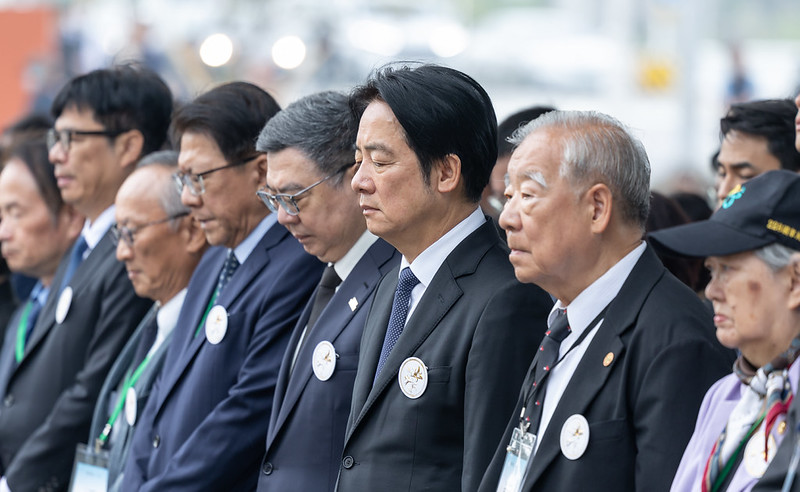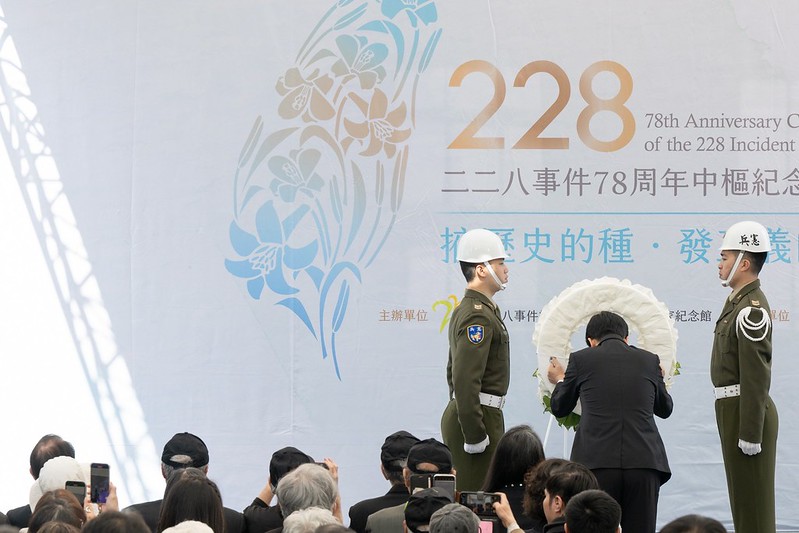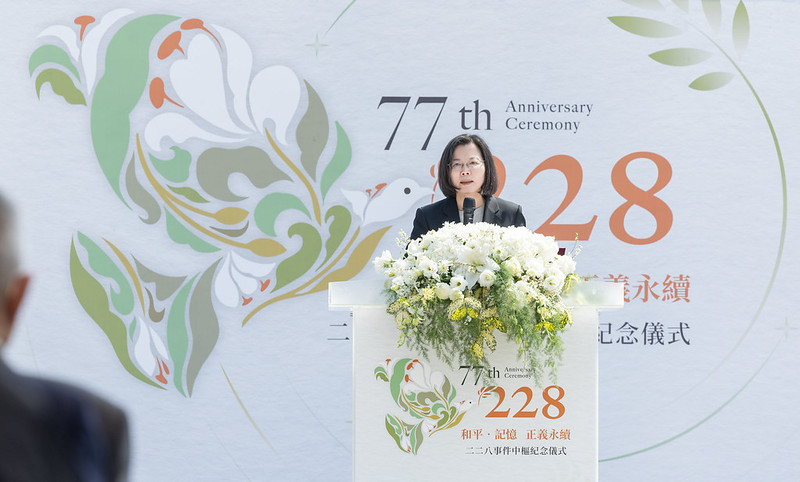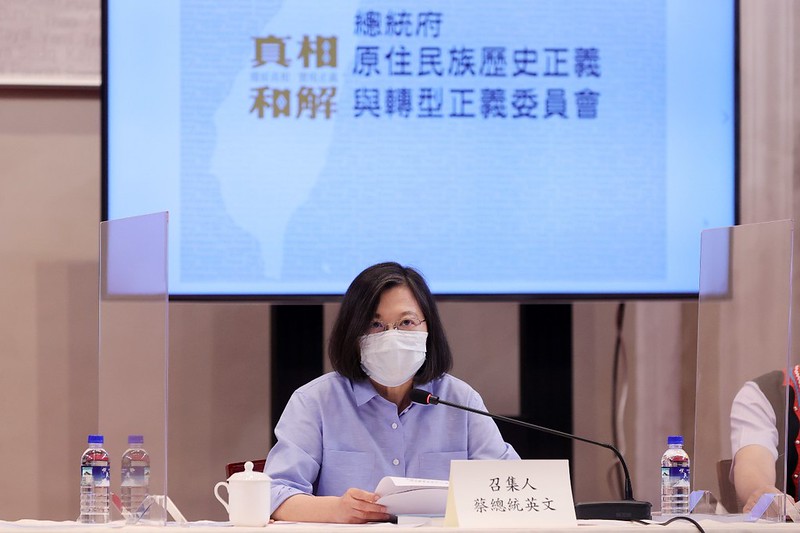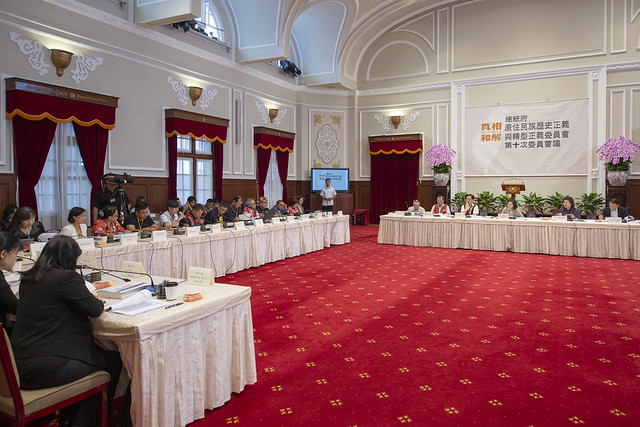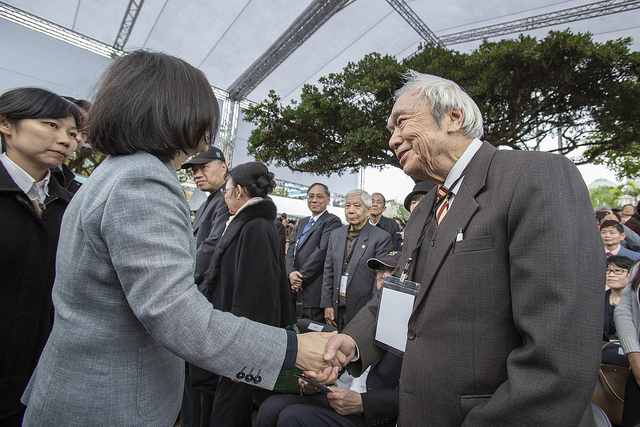News & activities
 News releases
News releases
President Tsai Ing-wen attended the nation's main memorial ceremony to mark the 72nd anniversary of the 228 Incident on the afternoon of February 28, which was themed "Truth—Dignity—Moving Forward Together." In addition to presenting flowers to show respect for the victims, the president emphasized that her government's goal in pursuing transitional justice is to enable all persons residing in Taiwan to live each day with peace of mind—to read freely, express opinions freely, and build a better democratic society together. She said that the people of Taiwan will not forget the 228 Incident. She also declared that all facts which have not yet come to light will gradually be revealed as transitional justice continues to progress, and will remain indelibly imprinted in the memories of Taiwanese who have so ardently hoped to learn the truth.
The following is a translation of President Tsai's remarks:
I want to begin my remarks by mentioning that last October I attended a ceremony where the Transitional Justice Commission announced the rescission of many wrongful convictions rendered in the past.
Everyone here is very familiar with Chung Yi-jen (鍾逸人), who was the leader of the "27th Corps" after the 228 Incident. Mr. Chung was among the principal guests at that ceremony last October. Already 98 years old at the time, he made an impassioned call for us to understand that when he was arrested in 1947, he was a captive, not a criminal. His words led me to the profound realization that restoring his good name was more than just belated justice for Mr. Chung personally, it was a step toward a new page in Taiwan's history.
Not long ago, the 228 Memorial Foundation searched through publicly accessible archives to identify and verify the identities of more than 400 possible victims of the 228 Incident who have not yet applied for reparations.
This shows that we still don't sufficiently understand our historical truth. So our work will continue.
In addition to compensating individual victims and their family members, it is equally important that we systematically clarify what actually occurred during the incident. Later this year, the 228 Memorial Foundation will release a new report that will be translated into multiple different languages to support exchanges with friends from around the world who care about the 228 Incident.
Also, Taiwan's transitional justice work entered into a new phase over the past year when the Transitional Justice Commission commenced operations.
I'll be frank with you. The Transitional Justice Commission had a bit of a rough start, and sparked intense debate. However, the Commission has worked hard, and has some excellent results to show for it. For example, it has built up a collection of political archival records, established databases, and rescinded many wrongful convictions.
Of course, time is indeed the greatest enemy of transitional justice. Even as we undertake this task, the number of elderly victims who will have a chance to see the results of our work continues to dwindle. Huang Chin-tao (黃金島), who participated in the "27th Corps" alongside Chung Yi-jen, passed away last month just a bit more than 90 days after his wrongful conviction was rescinded.
And today, I'm issuing a certificate of restored reputation to Chang Mu-huo (張木火). His son Chang Chun-yen (張俊彥), former president of National Chiao Tung University, applied for this certificate on his father's behalf, but unfortunately is not able to see it awarded, as he passed away last year.
Time is unforgiving that way, reminding us that transitional justice work in Taiwan has gotten off to a late start, so we must proceed all the more quickly.
Some mistakenly think that transitional justice is just an issue of political contention, while others feel that the past should be left in the past. Well, I'm here to say, in no uncertain terms, that I disagree with such views.
Any country that has experienced the democratization process must face its authoritarian past.
The past will not fade on its own. Old wounds may close over on the surface, but emotional trauma lingers. Our purpose in seeking transitional justice is to heal these wounds. We need to remind ourselves of our past injuries, and that we must not make the same mistakes again.
At the National Human Rights Museum that opened to the public last year, and in the new school curriculum to be implemented later this year, transitional justice is treated as crucial to the further growth of Taiwan's democracy. Taiwan still has a lot of work to do regarding human rights, and the public and private sectors must come together to face this issue.
There are events taking place today all over Taiwan to commemorate the 228 Incident. Just a little while from now, for example, young people will hold the Gongsheng Music Festival on Ketagalan Boulevard to commemorate the incident.
The Gongsheng Music Festival has been held annually for the past seven years, and young people handle all the planning and fundraising. In addition to musical performances, they organize guided tours and "human library" activities to teach participants about the 228 Incident.
There's a children's playground in one corner of the 228 Peace Memorial Park where children today happily slide and swing and play in the sand. This is the first day of a long weekend, and their busy parents at last have the time to take a breather from work and spend some time with family.
In pursuing transitional justice, we want to make it possible for every single person living in Taiwan to feel the same sense of ease each day that they're feeling today. We want to ensure that they don't have to worry about violent government suppression, about police taking them away from their homes in the middle of the night, never to return. We want them to be able to read freely, and express their opinions freely. We want to work together to build a better democratic society.
Everyone here can rest assured that Taiwan will never forget the 228 Incident. This incident may have taken from us an entire generation of our nation's brightest at the prime of their lives, and it may have ushered in more than a half-century of silence. But when spring arrives, even the deep snow atop Jade Mountain will melt away.
The fabric of history is woven from countless threads. Many of the facts of history remain unknown, but they will gradually be revealed as transitional justice is implemented, and will remain indelibly imprinted in the memories of Taiwanese who have so ardently hoped to learn the truth. This is our fervent hope for the future. Thank you, everyone!
After concluding her speech, President Tsai personally awarded "certificates of restored reputation" to the family members of 228 victims Wang Fu (王富), Hsu Chin-shui (許金水), Chang Mu-huo (張木火), and Tseng Lin-tu (曾琳土). Also present at the ceremonies were Premier Su Tseng-chang (蘇貞昌), Taipei Mayor Ko Wen-je (柯文哲), Senior Advisor to the President Yao Chia-wen (姚嘉文), Minister of the Interior Hsu Kuo-yung (徐國勇), Minister of Culture Cheng Li-chiun (鄭麗君), Transitional Justice Commission Acting Chairwoman Yang Tsui (楊翠), Chairman Hsueh Hua-yuan (薛化元) of the 228 Memorial Foundation, Legislator Yu Mei-nu (尤美女), as well as the family members of 228 victims.
